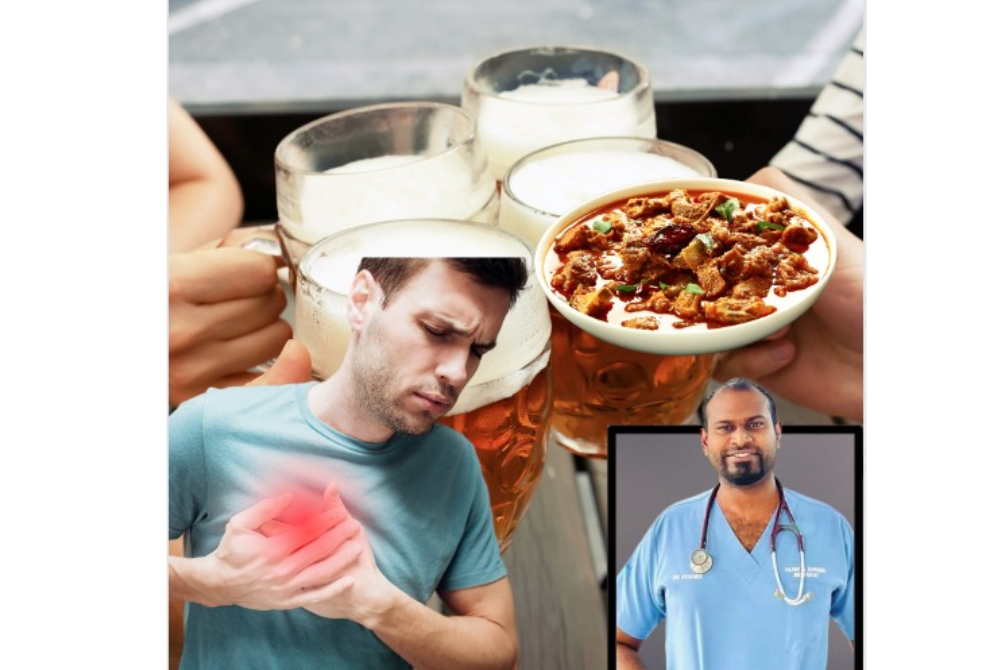Of mutton curry, alcohol and heart attack

APART from being known as the festival of lights, Deepavali is also synonymous with a spread of delicious and traditional Indian food.
While murukku, a savoury, crunchy snack, is a well-recognised treat during Deepavali, mutton curry and perattal steal the show at any Deepavali open house.
The joy of making murukku with the family was incomparable; from the oldest to the youngest, each would be assigned to the ultimate murukku-making job.
However, any Indian would affirm that there is no Deepavali without mutton curry or perattal.
Unlike other Deepavali dishes, delicacies made with mutton are especially cherished by the Indians celebrating the festival.
Orders for meat are placed weeks or even months in advance to secure a good stash for cooking throughout the Deepavali holidays.
Families celebrating Deepavali with extended relatives often pool money to buy large portions of meat; some may even purchase an entire goat to be slaughtered for the festivity.
Elders in the family would usually be at war in the kitchen to put out the best-tasting dishes for the family and guests, including the finest mutton curry.
For Deepavali breakfast, a traditionally rich and aromatic mutton curry is typically served, complemented by the pairing of steaming hot thosai and soft idli. This would leave an indelible mark on your taste buds.
With the overwhelming intake of mutton, Indian men also celebrate the festivity with the consumption of alcohol which many Indian men would see as an essential part of the celebration.
However, little do we know about the potential dangers of coupling mutton and alcohol, which could lead to serious heart issues.
Dr Vicknes Mathiventhen from Klinik & Surgeri Medi-Sihat sheds light on the risk of heart-related disease, which is coupled with the consumption of alcohol.
Mutton increases the risk of coronary heart disease (CHD)
He said mutton, lamb and beef are classified as red meat and mutton dishes (gravy, perattal) served during the festival have a high content of oil and salt.
"The increased risk of CHD is driven by significant amounts of sodium, saturated fatty acids, cholesterol and iron, which are contributory factors to atherosclerosis, hypertension, dyslipidemia, and type 2 diabetes.
"These are the leading causes of CHD globally," he told Sinar Daily.
Consumption of mutton increases the risk of CHD and stroke, he added.
"Studies have shown that an intake of 50 grammes per day of red meat increases the risk of CHD by nine per cent," he said.
Coronary heart disease is the primary cause of mortality in Malaysia.
Dr Vicknes said coronary heart diseases have become the primary cause of mortality globally.
"In Malaysia, CHD is the principal cause of mortality among other cardiovascular diseases.
"A recent study done in 2022 by University Putra Malaysia showed that the Chinese appeared to have a higher risk of CHD as compared to Malays and Indians.
"This is mainly due to the fact that the Chinese population was more health-conscious and was more likely to undergo regular medical checkups in the country.
"However, differences in dietary, lifestyle and cultural factors influence the risk of CHD between races," he said.
Red meat contributes to atherosclerosis (the buildup of plaques within the artery) and hypertension, Dr Vicknes added.
Red meat and alcohol, a lethal combo
"High concentrations of alcohol will cause vasoconstriction, which is the shrinking of blood vessels that would lead to hypertension.
"High intakes of both red meat and alcohol together will lead to a higher risk of CHD," he said.
He, however, said if taken in small to moderate amounts, it has a lower risk, but the risk is still there.
Regular medical checkups are a must
Dr Vicknes emphasised the importance of consistently checking and understanding your health status.
"You should undergo regular medical checkups to be aware and to understand your current health status.
"With this, you will be cautious when it comes to feasts. If you are diabetic or hypertensive, for example, regularly monitor your blood sugar and blood pressure; never forget to take your medications; be disciplined; and always listen to your doctor," he said.









